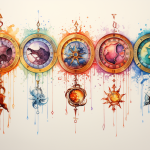Dream About Cancer: What It Means and Why It May Reflect More Than You Think
Dreams can be deeply symbolic, stirring our emotions and revealing parts of our subconscious we may not consciously acknowledge. Dreaming about cancer can be particularly distressing, often evoking fear, sadness or concern. But what does it actually mean to dream about cancer? Does it signify something literal, or is it more metaphorical?
In this article, we’ll explore the possible interpretations of dreaming about cancer, including emotional and psychological meanings, common dream scenarios, and how your waking life might influence such dreams. Our goal is to help you reflect on your experience in a calm, insightful way that feels human, helpful and grounded.
What Does It Mean to Dream About Cancer?
When you dream about cancer, it rarely means you’re receiving a literal health warning. Rather, these dreams often symbolise emotional decay, unresolved issues, or a part of your life that is being “eaten away” from the inside out.
Cancer in dreams may represent:
- Ongoing emotional distress or anxiety.
- Toxic relationships or environments.
- A deep fear of loss, deterioration, or helplessness.
- A metaphor for something out of control in your life.
Dreams like this can also reflect your subconscious grappling with the fear of death, change, or emotional suffering.
Common Cancer Dream Scenarios and Their Meanings
1. Dreaming That You Have Cancer
If you dream that you have cancer, it might not relate to your physical health at all. Instead, it often symbolises feeling emotionally drained, overwhelmed, or trapped in a toxic situation. You may feel that a part of your life—such as a job, relationship, or belief—is slowly consuming your energy or happiness.
It could also reflect feelings of guilt, self-blame, or inner conflict. Perhaps you’re neglecting your own well-being or avoiding a difficult but necessary change.
2. Dreaming That a Loved One Has Cancer
This type of dream can be deeply upsetting. It may not mean that you’re intuiting a health issue but rather expressing anxiety about someone you care for, or your fear of losing them. It could also reflect your feelings of helplessness if that person is struggling in real life—even if not with their health.
Alternatively, this dream might suggest you perceive negativity or emotional suffering in your relationship with that person, or that their presence in your life is associated with sadness or emotional burden.
3. Dreaming of Cancer Without a Person (e.g., reading about it or hearing the word)
Sometimes, the theme of cancer appears more abstractly—perhaps in conversation, headlines, or a medical report in your dream. This may point to generalised anxiety, fear of the unknown, or collective stress you’ve absorbed from the outside world.
In an age where health and mortality are often front-of-mind—especially post-pandemic—your subconscious may be processing ambient fears or societal stressors that you haven’t fully acknowledged.
Emotional and Psychological Interpretations
From a psychological perspective, cancer in a dream may symbolise something festering beneath the surface. This could be:
- A grudge or resentment that’s been left unresolved.
- An unhealthy pattern of thinking or behaviour.
- A persistent fear of failure, abandonment, or inadequacy.
In Jungian dream analysis, illness often symbolises aspects of the self that are being ignored or denied. Cancer, specifically, may be seen as an issue that is growing in strength because it’s being suppressed rather than faced.
Spiritual Meaning of Dreaming About Cancer
In spiritual or metaphysical interpretations, dreaming of cancer can signify a need for emotional healing and transformation. Cancer represents energy that is stuck or destructive—emotions like bitterness, guilt, or shame that are calling for release and transmutation.
Such a dream may encourage you to:
- Reconnect with your intuition.
- Remove toxic influences from your life.
- Prioritise self-love, healing, and spiritual growth.
Some spiritual frameworks also interpret cancer dreams as signs of awakening or deep change, albeit through painful or challenging means.
What to Ask Yourself After a Cancer Dream
To better understand the meaning behind your dream, consider reflecting on these questions:
- What specific emotions did I feel in the dream? Fear, sadness, helplessness?
- Was the cancer in the dream mine or someone else’s?
- Is there an area of my life that feels out of control or harmful?
- Am I ignoring any red flags—emotionally, physically, or spiritually?
By considering these elements, you can uncover deeper insights and understand how the dream connects to your waking experience.
How Real-Life Experiences Influence Cancer Dreams
If you or someone close to you has dealt with cancer—either recently or in the past—your dream could simply be a reflection of real fears, memories, or unresolved grief. These dreams might be your mind’s way of processing trauma, sadness, or hope for healing.
It’s important to note that just because you dream about cancer doesn’t mean you’re receiving a premonition. It is far more likely that your subconscious is expressing emotional stress or symbolic struggle.
Final Thoughts: Finding the Message Within the Fear
Dreams about cancer can be intense and unsettling, but they are rarely literal. Instead, they often point to emotional unrest, toxic elements in your life, or deep-seated fears. While it’s natural to feel anxious after such a dream, it’s also a powerful opportunity for self-reflection.
Use the dream as a mirror. Ask yourself: What in my life needs healing? Where am I feeling powerless? And what emotional weight am I carrying that I could begin to release?



